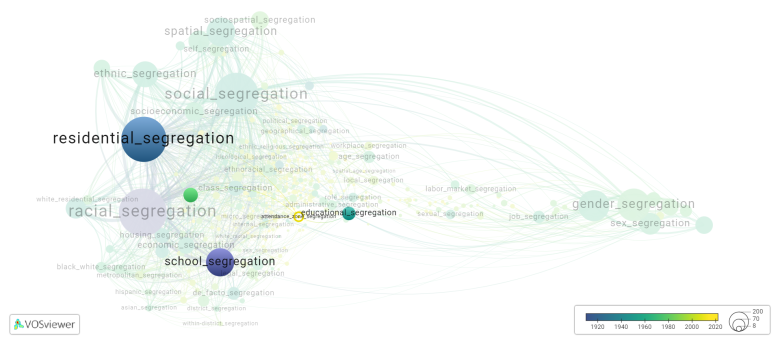Attendance zone segregation: Difference between revisions
(Creating page) |
(Creating page) |
||
| (14 intermediate revisions by the same user not shown) | |||
| Line 1: | Line 1: | ||
===== Date and country of first publication<ref>Date and country of first publication as informed by the Scopus database (December 2023).</ref>===== | |||
2021<br> | 2021<br> | ||
United States | |||
===== Definition ===== | |||
Attendance zone segregation refers to the practice of intentionally or unintentionally creating attendance zones for schools that result in the segregation of students based on their race, ethnicity, or socioeconomic status. This can occur when attendance boundaries are drawn to concentrate students from low-income neighborhoods or racial minority groups in certain schools, while students from wealthier or predominantly white neighborhoods attend other schools. The result is a perpetuation of educational inequities and unequal access to resources and opportunities. Attendance zone segregation can contribute to the achievement gap and exacerbate social and economic disparities in society. | Attendance zone segregation refers to the practice of intentionally or unintentionally creating attendance zones for schools that result in the segregation of students based on their race, ethnicity, or socioeconomic status. This can occur when attendance boundaries are drawn to concentrate students from low-income neighborhoods or racial minority groups in certain schools, while students from wealthier or predominantly white neighborhoods attend other schools. The result is a perpetuation of educational inequities and unequal access to resources and opportunities. Attendance zone segregation can contribute to the achievement gap and exacerbate social and economic disparities in society. | ||
==See also== | ==See also== | ||
==Related segregation forms== | |||
Attendance zone segregation is frequently discussed in the literature with the following segregation forms: | |||
[[school segregation]], [[residential segregation]], [[income segregation]], [[educational segregation]] | |||
[[File:attendance_zone_segregation.png|780x780px]] | |||
This visualization is based on the study [[Segregation_Wiki:About| The Multidisciplinary Landscape of Segregation Research]]. | |||
For the complete network of interrelated segregation forms, please refer to: | |||
* [https://tinyurl.com/2235lkhw First year of publication] | |||
* [https://tinyurl.com/2d8wg5n3 Louvain clusters] | |||
* [https://tinyurl.com/223udk5r Betweenness centrality] | |||
* [https://tinyurl.com/244d8unz Disciplines in which segregation forms first emerged (Scopus database).] | |||
==References== | ==References== | ||
== | ==Notes== | ||
<references /> | |||
{{NoteAI}} | |||
==Attendance zone segregation appears in the following literature== | |||
Taylor K. | Taylor K., Frankenberg E. (2021). Student Assignment Policies and Racial and Income Segregation of Schools, School Attendance Zones, and Neighborhoods. ''Educational Administration Quarterly'', ''57''(5), 747-775. SAGE Publications Inc..https://doi.org/10.1177/0013161X211024720 | ||
Latest revision as of 07:17, 16 October 2024
Date and country of first publication[1][edit | edit source]
2021
United States
Definition[edit | edit source]
Attendance zone segregation refers to the practice of intentionally or unintentionally creating attendance zones for schools that result in the segregation of students based on their race, ethnicity, or socioeconomic status. This can occur when attendance boundaries are drawn to concentrate students from low-income neighborhoods or racial minority groups in certain schools, while students from wealthier or predominantly white neighborhoods attend other schools. The result is a perpetuation of educational inequities and unequal access to resources and opportunities. Attendance zone segregation can contribute to the achievement gap and exacerbate social and economic disparities in society.
See also[edit | edit source]
Related segregation forms[edit | edit source]
Attendance zone segregation is frequently discussed in the literature with the following segregation forms:
school segregation, residential segregation, income segregation, educational segregation

This visualization is based on the study The Multidisciplinary Landscape of Segregation Research.
For the complete network of interrelated segregation forms, please refer to:
References[edit | edit source]
Notes[edit | edit source]
- ↑ Date and country of first publication as informed by the Scopus database (December 2023).
At its current state, this definition has been generated by a Large Language Model (LLM) so far without review by an independent researcher or a member of the curating team of segregation experts that keep the Segregation Wiki online. While we strive for accuracy, we cannot guarantee its reliability, completeness and timeliness. Please use this content with caution and verify information as needed. Also, feel free to improve on the definition as you see fit, including the use of references and other informational resources. We value your input in enhancing the quality and accuracy of the definitions of segregation forms collectively offered in the Segregation Wiki ©.
Attendance zone segregation appears in the following literature[edit | edit source]
Taylor K., Frankenberg E. (2021). Student Assignment Policies and Racial and Income Segregation of Schools, School Attendance Zones, and Neighborhoods. Educational Administration Quarterly, 57(5), 747-775. SAGE Publications Inc..https://doi.org/10.1177/0013161X211024720
